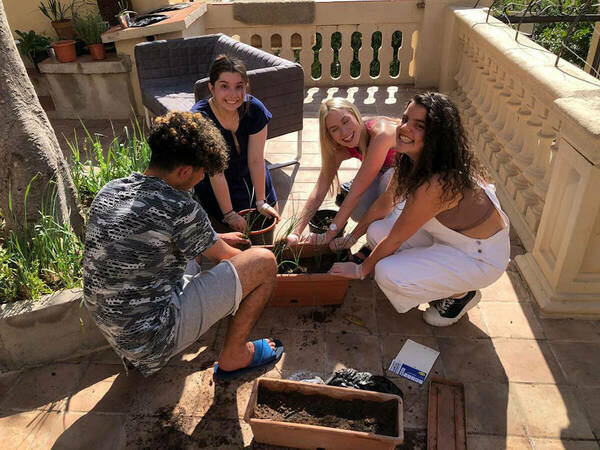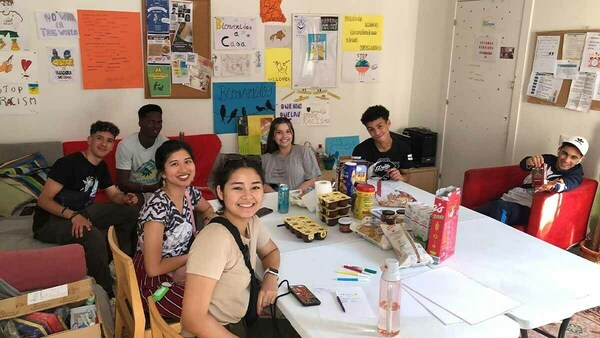Aria Bossone ’25 is a B.A. student at the University of Notre Dame majoring in American studies and peace studies with a minor in gender studies. During the summer of 2023, she traveled to Barcelona, Spain, with support from a Nanovic Institute for European Studies grant. She partnered with ImpacTrip and joined its efforts to help refugees and migrants successfully navigate European society and develop skills, such as the English language, to help them access the resources they need.
I am not typically an airplane snacker; however, on my way to Barcelona for my service project this summer, I felt the urge to get some tasty treats to help ease my nerves. While my snacking endeavors outside of an airport may have included delectable caramel M&Ms or perfectly seasoned, tangy-yet-not-too-tangy sour cream and onion Pringles, something told me to reach for the classics. No fancy caramel or seasonings. Just plain M&Ms and original Pringles.
While snacking on the plane, all I could think about was the upcoming four weeks and how surreal it all felt. Just last fall, I took Professor Jennifer Huynh's Critical Refugee Studies (CRS) class, and it opened my eyes to the world of refugee and migrant studies, forging a new path within my peace studies endeavors. It inspired me to find hands-on experience working with migrants, which led me to apply for the ImpacTrip program in Barcelona.

So, what do plain M&Ms and original Pringles have to do with working with migrants in one of Europe’s most bustling cities? These simple snacks, in conjunction with the work that I did for four weeks in Barcelona, brought about a stark realization that has changed my approach to peace studies in Europe and around the world: the beauty of simplicity.
ImpacTrip described the BarcelonActua program’s goal as being “to welcome 18 to 25 years old boys [...], to help them to integrate into Barcelona society and, of course, empower them to become independent.” The program itself “seeks the socialization of this group of people through a common interest with the volunteers: cooking, eating, and the English language.” The program description goes on to share what the daily life of volunteers entails, including preparing food, socializing with participants over meals, and conversationally reinforcing English learning, which ImpacTrip says “can undoubtedly be an important skill for their future.”
Cooking, eating, speaking, and teaching; at first, I questioned if this work was “worthy” of applying for a Service Grant from the Nanovic Institute. It all seemed too elementary to deserve support from one of the top institutions for European studies in the country; but, just as my eyes were reopened to the deliciousness of the most basic M&Ms and Pringles flavors, after my experience in this program, I realized how necessary these simple connections are to understand the ins and outs of European culture and conflict from migrants’ perspectives. We as humans have been cooking, eating, and talking for millennia. It is arguably in our most basic human nature to do so. However, I feel as though we abandoned our roots and now assign more value to complexity and difficulty; often, we–including me just a few weeks ago–view simpler modes of connection as “lesser” than “greater” complex ones. Based on my experience in Barcelona, that could not be further from the truth.

On my first day volunteering at the BACstation Vallcarca house, the experience seemed intimidating. My Spanish speaking skills were not perfect, and I had to interact with about 15 young men, many of whom only spoke Arabic and Spanish. They were all shy in the beginning. Many did not want anything to do with the volunteers, but I was dedicated to doing my job well, so I took the initiative to start conversations–at least as well as I could with the slight language barrier. These conversations gave the men a certain confidence in themselves that I had not seen. After speaking with many of them, they shared that our conversations were some of the only times they had felt heard in a while.
We ought to question why we value complexity over simplicity, and whether or not that is an accurate presumption.
Professor Huynh's CRS class taught me to keep migrants’ autonomies front and center; that is always the priority. This principle remained at the core of my work. Whether we were cooking, gardening, or simply playing board games, these simple interactions allowed many of the men to confide in me about their migration from Morocco, Guinea, Burkina Faso, and other countries and about the struggles they had faced thus far in Europe. Without the simplicity of conversation, I would not have gotten an inside perspective into their experiences as refugees and migrants.
I propose that we ought to go back to the basics. We ought to question why we value complexity over simplicity, and whether or not that is an accurate presumption. From this experience, I have learned that simple, grassroots-level conversation in combination with diverse culinary cultures can be just as impactful as macro-level, complex initiatives, and I hope to manifest this newfound lesson throughout my future peace work.
Read about other students' experiences on Nanovic Navigator
Originally published by at nanovicnavigator.nd.edu on August 23, 2023.